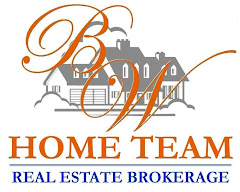According to the latest Realtors Confidence Index (RCI), one out of every 10 recent homes sales has been a short sale. What's a short sale you ask? A short sale is when the lender agrees to let the homeowner sell their home for less than what they owe that lender to avoid a foreclosure, which can be a win-win for both the seller and the lender. How can this be? Typically a foreclosure will cost the lender more than taking less than what is owed on the property due to legal fees. The win for the seller is the fact that they will be able to get another home loan within 24 months after the short sale. Those looking to get a home loan that have been foreclosed on would have to wait at least 5 years.
Something a potential buyer of a short sale property needs to remember is that yes, you can get a good deal on a short sale, most of the time better than when a property has gone into foreclosure, but the deal has to make good business sense to the lender. It must make the lender more money than what they would make if they foreclosed, paid the legal fees, and sold the property closer to market value. Thus, most lenders will not agree to a short sale for 50% of asking price!
Homeowners, remember that the short sale must be approved by your lender. If you financed your home with two liens, a first and a second, the secondary lender in theory should receive nothing if a short sale doesn't cover what the first lien holder is owed. However, the second-lien holder must release their claim in order for a short sale to proceed, which gives them some leverage. There is not much incentive for them to agree to a short sale and receive nothing, so both lenders and your real estate agent must work together to make the process come together. This is just one of the reasons why short sales are known to be a long process. Still, the benefits to a short sale are well worth patience from both a buyer and a seller.
Are you behind on your mortgage payments, facing foreclosure, and think a short sale may be the answer for you? First, find a good real estate agent (BW Home Team has excellent, highly trained agents in the short sale process!) and start gathering documentation. Your real estate agent can help you with this.
The paperwork you will need for most lenders is:
1) Authorization to release information to your real estate agent. You can't start the file without this.
2) Detailed financial information. This includes 2-3 months of bank statements, federal income tax returns for the past two years, and paycheck stubs for the last 2-3 months. These must be provided by all borrowers on your lien. You must state you are unemployed if you are.
3) Financial worksheet - Each bank may have their own you can download. This worksheet shows all assets and debts. This will establish whether you are financially going through hardship.
4) Hardship Letter - You must state the hardship you are facing. Lenders would like to see that the hardship is not temporary. Make sure the letter is clear and legible and have your real estate agent proof it for you!
5) Bankruptcy - Are you going to decide to file for bankruptcy? This can cause delay to the short sale. Make sure your short sale is done before any legal proceedings begins.
6) Listing agreement with your real estate agent - Lender would like to know that you have made an attempt to sell the property.
7) Offer - The lender will not start or take your short sale seriously until you have an offer on your property.
Contact the BW Home Team today if you are interested in finding out more about short sales, whether you are a buyer or a seller. As a buyer, you can even search our website via keywords such as short sale, lender must approve, etc.! It's as easy as typing those words in the description box.
List courtesy of Jimmy Nguyen and Short Sale Rockstars - Facebook
Subscribe to:
Post Comments (Atom)


No comments:
Post a Comment